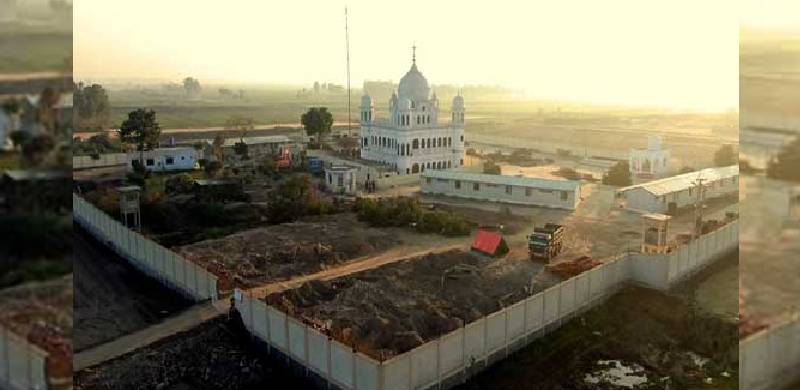
As Kartarpur Corridor opens up access for the Sikh community to their most revered place, farmers of the area still await compensation for the land taken from them to build this corridor.
Kartarpur Corridor has been inaugurated with much celebrations and fervour as more than 15000 members of the Sikh community made their way to Gurdwara Kartarpur Sahib to celebrate the 550th birth anniversary of Baba Guru Nanak.
The gurdwara is situated on an area of 1300 acres, while the corridor, connecting the gurdwara to the border with India, is 4 kilometres long. The corridor would allow around 5000 Sikh pilgrims daily to visit the final resting place of their most revered holy figure.
The corridor, apart from being a cause of celebration for the Sikh community, is also a source of happiness for Pakistani people, who have felt pride over easing Sikhs’ journey to their most revered place.
Unfortunately, the story of the Kartarpur Corridor also includes the pain of the farmers whose lands the corridor is built on.
In November of 2018, following agreement between Indian and Pakistani authorities for the construction of the Kartarpur Corridor, Prime Minister Imran Khan visited the site and ordered that land in Kartarpur and the nearby village of Dodhay be acquired officially by the government.
Military engineering organisation Frontier Works Organisation was given the contract for the construction of the corridor. Following this, farmers’ agricultural land was destroyed and in April 2019, 1500 acres of land were forcefully taken from the farmers of the area without telling them how much they would be paid for the land.
Moreover, they were not immediately compensated for their land. Similar was the treatment meted out to farmers and small landlords of nearby villages of Kothay Khurd and Kothay Kalaan.
A five-member delegation of the Human Rights Commission of Pakistan, which visited the area in April 2019, was told by farmers that they received offers of Rs5 million from members of the Sikh community, who wanted to buy their land. However, farmers had refused to sell their land.
Meanwhile, local authorities kept telling farmers that they would be compensated, and they would be given a good price for their lands. The farmers carried out various protests regarding the matter.
Till now, majority of the farmers whose lands were acquired for the project have not been paid and it is being said that for every acre of land, farmers would be getting around Rs0.7 to Rs0.8 million. It is interesting to note that the turbans available in the shops in the vicinity of the Gurdwara, built on these farmers’ lands, goes up to Rs2.5 million.
Moreover, the commercial land in this area is valued at Rs4 to Rs5 million, however, the government does not want to pay this amount to the farmers.
Leader of the farming community in Dodhay, Muhammad Khaleeq, informed Pakistan Farmers Rabita Committee a year ago that their crops were destroyed and they were unaware as to how the government would treat them.
Kartarpur Corridor has been inaugurated with much celebrations and fervour as more than 15000 members of the Sikh community made their way to Gurdwara Kartarpur Sahib to celebrate the 550th birth anniversary of Baba Guru Nanak.
The gurdwara is situated on an area of 1300 acres, while the corridor, connecting the gurdwara to the border with India, is 4 kilometres long. The corridor would allow around 5000 Sikh pilgrims daily to visit the final resting place of their most revered holy figure.
The corridor, apart from being a cause of celebration for the Sikh community, is also a source of happiness for Pakistani people, who have felt pride over easing Sikhs’ journey to their most revered place.
Unfortunately, the story of the Kartarpur Corridor also includes the pain of the farmers whose lands the corridor is built on.
In November of 2018, following agreement between Indian and Pakistani authorities for the construction of the Kartarpur Corridor, Prime Minister Imran Khan visited the site and ordered that land in Kartarpur and the nearby village of Dodhay be acquired officially by the government.
Military engineering organisation Frontier Works Organisation was given the contract for the construction of the corridor. Following this, farmers’ agricultural land was destroyed and in April 2019, 1500 acres of land were forcefully taken from the farmers of the area without telling them how much they would be paid for the land.
Moreover, they were not immediately compensated for their land. Similar was the treatment meted out to farmers and small landlords of nearby villages of Kothay Khurd and Kothay Kalaan.
A five-member delegation of the Human Rights Commission of Pakistan, which visited the area in April 2019, was told by farmers that they received offers of Rs5 million from members of the Sikh community, who wanted to buy their land. However, farmers had refused to sell their land.
Meanwhile, local authorities kept telling farmers that they would be compensated, and they would be given a good price for their lands. The farmers carried out various protests regarding the matter.
Till now, majority of the farmers whose lands were acquired for the project have not been paid and it is being said that for every acre of land, farmers would be getting around Rs0.7 to Rs0.8 million. It is interesting to note that the turbans available in the shops in the vicinity of the Gurdwara, built on these farmers’ lands, goes up to Rs2.5 million.
Moreover, the commercial land in this area is valued at Rs4 to Rs5 million, however, the government does not want to pay this amount to the farmers.
Leader of the farming community in Dodhay, Muhammad Khaleeq, informed Pakistan Farmers Rabita Committee a year ago that their crops were destroyed and they were unaware as to how the government would treat them.
